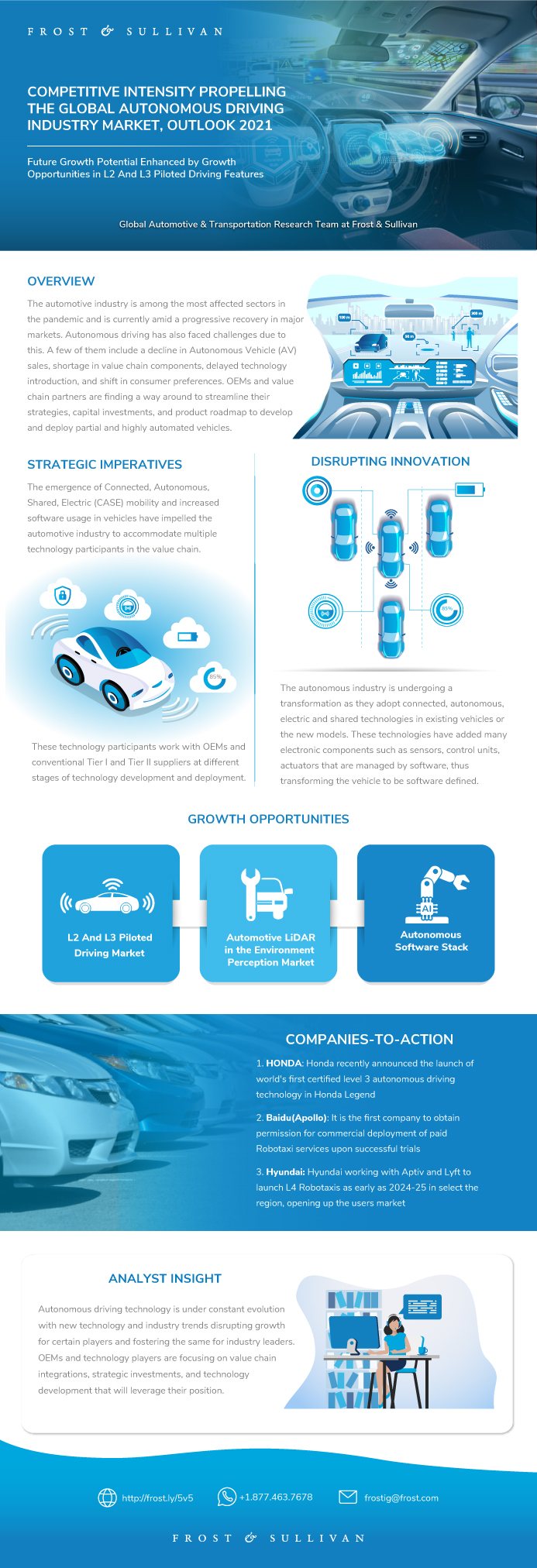Competitive Intensity Propelling the Global Autonomous Driving Industry Market, Outlook 2021
Competitive Intensity Propelling the Global Autonomous Driving Industry Market, Outlook 2021
Future Growth Potential Enhanced by Growth Opportunities in L2 And L3 Piloted Driving Features
30-Apr-2021
Global
$4,950.00
Special Price $3,712.50 save 25 %
Description
The automotive industry is among the most affected sectors in the pandemic and is currently amid progressive recovery in major markets. Autonomous driving has also faced challenges due to this. A few of them include a decline in Autonomous Vehicle (AV) sales, shortage in value chain components, delayed technology introduction, and shift in consumer preferences. OEMs and value chain partners are finding a way around to streamline their strategies, capital investments, and product roadmap to develop and deploy partial and highly automated vehicles.
In 2021, many major OEMs will focus on the deployment of Level 2 and Level 2+ partial automation driving systems in mass-market vehicles and Level 3 conditional automation in a few premium models. Global regulations favoring testing and deployment will determine the adoption timeline for consumer markets. China will lead the usership model of Level 4 robotaxis by operation of paid services for public use within predefined geographies. Autonomous shuttles will also be commercially deployed within controlled environments.
In this 2021 outlook, Frost & Sullivan has highlighted 3 key market and business trends that have been affected by the changing dynamics of the autonomous ecosystem. The outlook also highlights 3 key technology trends that Frost & Sullivan expects will see fast advancements, with focus on highly automated vehicle commercialization.
• Market trends include reprioritization of OEM strategies, insurance business models for piloted driving, evolution of technology participants, and the emergence of Tier 0.5 suppliers.
• In terms of technology, the focus is expected to be on developing in-house capabilities for scalable hardware and software that will allow OEMs to offer Over the Air (OTA) upgrades for future developments. Trends include in-cabin monitoring systems, System on Chip (SoC), and Frequency Modulated Continuous Wave (FMCW) technology in LiDARs.
This research service highlights these trends and explains their impact along with use cases.
Key Issues Addressed
- What are the new business strategies adopted by OEMs and technology providers in 2021?
- How is the global autonomous market expected to grow by 2025 based on new SAE definitions?
- Which are the key companies expected to announce new innovations in 2021?
RESEARCH: INFOGRAPHIC
This infographic presents a brief overview of the research, and highlights the key topics discussed in it.Click image to view it in full size

Table of Contents
Key Highlights 2020—Autonomous Driving
Challenges Faced by the Global Autonomous Driving Industry Due to COVID-19
The 2020 Global Autonomous Driving—Actuals Versus Forecast
Global Autonomous Vehicle Forecast, 2020–2025
Overview of Market and Technology Trends for 2021
Top Predictions for 2021—Autonomous Driving
Why Is It Increasingly Difficult to Grow?
The Strategic Imperative 8™
Impact of the Top-Three Strategic Imperatives on Autonomous Driving Industry
Growth Opportunities Fuel the Growth Pipeline Engine™
Vehicle Segmentation
SAE Definitions
COVID-19 Impact on World GDP Growth
Global Growth Scenario Analysis—Assumptions
World GDP Growth Under Differing Scenarios
COVID-19 Impact on Key Regions
Global Light Vehicle Sales, 2008 to 2021
Market Assumptions—Global Autonomous Driving Market
Technology Assumptions—Global Autonomous Driving Market
Global Autonomous Vehicle Forecast, 2020–2025
L2,L2+ Global Sales Units 2020–2025
Overview of ADAS/Autonomous Driving Regulations, Global
Regulations Overview for ADAS/AD Implementation in Global Markets
Overall AD Roadmap
Market Trends—Autonomous Driving, 2021
Insurance Business Models for Piloted Driving
Insurance Premium Costs for Piloted Driving
Reprioritization of OEM Strategies
Value Chain Integration of OEMs for Reprioritization
Evolution of Technology Participants
Technology Companies Developing AD Integration Capabilities
Emergence of Tier 0.5
Collaboration for Co-Development of Advanced Technologies
Technology Trends—Autonomous Driving, 2021
In-Housing Autonomous Driving Software Stack
OEM Strategies in Software Stack Development
In-Cabin Monitoring System
Product Launch Roadmap—In-Cabin Monitoring System
System on Chip for AD
SOC Tailored to Address Layers of Autonomous Driving
Frequency Modulated Continuous Wave (FMCW) Technology in LiDAR
Benchmarking Capabilities of FMCW and Time of Flight (ToF) LiDAR
Market Segmentation—ADAS and AD Features by Levels of Autonomy
Key Growth Opportunities for 2021 to 2025
Autonomous Driving—Companies to Watch Out for
2021 Predictions—US
2021 Predictions—Europe (Excluding the UK)
2021 Predictions—The UK
2021 Predictions—Japan
2021 Predictions—China
Growth Opportunity 1: L2 And L3 Piloted Driving Market
Growth Opportunity 1: L2 And L3 Piloted Driving Market (continued)
Growth Opportunity 2: Automotive LiDAR in the Environment Perception Market
Growth Opportunity 2: Automotive LiDAR in the Environment Perception Market (continued)
Growth Opportunity 3: Autonomous Software Stack
Growth Opportunity 3: Autonomous Software Stack (continued)
Key Conclusions
List of Exhibits
List of Exhibits (continued)
Legal Disclaimer
Abbreviations And Acronyms Used
Learn More—Next Steps
Popular Topics
Key Issues Addressed
- What are the new business strategies adopted by OEMs and technology providers in 2021?
- How is the global autonomous market expected to grow by 2025 based on new SAE definitions?
- Which are the key companies expected to announce new innovations in 2021?
| No Index | No |
|---|---|
| Podcast | No |
| Author | Varun Krishna Murthy |
| Industries | Automotive |
| WIP Number | MFCF-01-00-00-00 |
| Is Prebook | No |
| GPS Codes | 9800-A6,9B13-A6 |
 USD
USD GBP
GBP CNY
CNY EUR
EUR INR
INR JPY
JPY MYR
MYR ZAR
ZAR KRW
KRW THB
THB